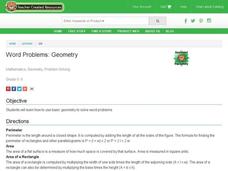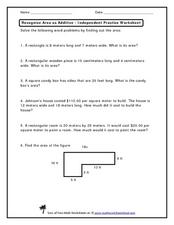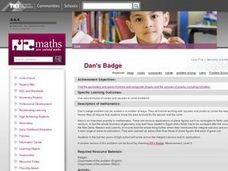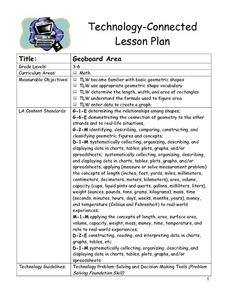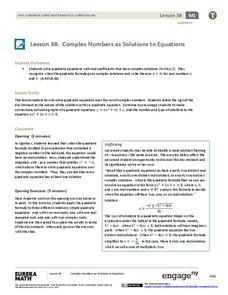Curated OER
Complexity Madness
Discuss different techniques for finding the area of a geometric shape, with a great visual guide. Using a real life example, learners calculate the area of a rectangle and a square.
Curated OER
Discovering Pi/Welcome to Pi Day
Learners explore pi. In this circle measurement lesson, students define and identify radius, diameter, circumference, and perimeter. Learners work in groups to measure several plastic lids and record their findings. Students compare the...
Illustrative Mathematics
Paper Clip
With minimal setup and maximum freedom, young geometers are encouraged to think outside the box on a seemingly simple application problem. Though the task seems simple, measuring a given paper clip and finding how many 10 meters can...
Curated OER
Word Problems: Geometry
Students solve word problems by using basic geometry. In this geometry instructional activity, students use geometric formulas to find the perimeter, area, and volume of objects. Students complete a worksheet.
Curated OER
Formulas for Volume and Surface Area
Students calculate the volume and surface area of each shape. In this geometry lesson plan, students use nets and other three dimensional polygons to create visuals of the volume of a shape. They define important vocabulary words...
Curated OER
Leveled Problem Solving: Area of a Parallelogram
Use this area of parallelogram worksheet to have learners solve the word problems by finding the area for the parallelograms in the six word problems.
Math Worksheets Land
Recognize Area as Additive - Independent Practice Worksheet
Activate your geometer's minds with area calculations, some of which are tricky. First, they solve five word problems dealing only with rectangular shapes. The next five use irregular shapes with side measurements given. Scholars solve...
Curated OER
Perimeter of Polygons in Word Problems
Can your scholars find the perimeter of Peter's square of gold? They examine the shape and are given it's four equal side measurements in millimeters. Learners solve for the perimeter and should be reminded to include units in their...
Virginia Department of Education
Exploring 3-D Geometry
Take young mathematicians on an exploration of the world of 3-D geometry with this seven-lesson unit. After first defining the terms perimeter, area, and volume and how they apply to the real world, students continue on...
Curriculum Corner
Area and Perimeter
Get third graders excited to work find area and perimeter of unit squares, rectangles, and irregular shapes. A 36-page packet comes with task cards, graphic organizers, practice worksheets, printables with squares, exit tickets, and word...
Curated OER
Algebra: Formulae
Students explore basic algebra formulas. In this introductory algebra instructional activity, student use basic algebra formulae to simplify expressions that include 1 or 2 operations.
Curated OER
The Luxor Hotel Contract
High schoolers determine the surface area of the Luxor Hotel, using the square feet of the base, volume, and the volume formula. They create a scale model of the triangular/pyramid shaped hotel.
Curated OER
Dan's Badge
Students solve a math problem using area formulas of circles and squares. They read and discuss the problem, analyze images of badges, reconstruct the badge from the problem using circles and rulers, and share the solution with the class.
Curated OER
Measurement: 2D and 3D
Young scholars solve volume problems. In this geometry lesson, the class watches a video about clean water (link provided) and individuals compare the volume of different prisms, including an actual drinking glass. Extension activities...
Curated OER
Volume of Solids
In this volume of solids worksheet, tenth graders solve and complete 20 various types of problems. First, they write the formula needed to find the volume of each solid. Then, pupils use the Pythagorean theorem to find the measure of the...
Curated OER
The Quadratic Formula
Students solve quadratic function by completing the square. In this algebra lesson, students use the quadratic formula to factor quadratics and find the roots. They graph the parabola and identify its properties.
Curated OER
Use Formulas for Perimeter
In this perimeter formula learning exercise, students solve a set of 6 word problems related to the perimeter of various shapes, then tell how they arrive at the answer.
Curated OER
Problem-Solving Application: Use Formulas: Practice
In this formula activity, students use formulas to solve 5 word problems, showing their work. Houghton Mifflin text is referenced.
Curated OER
Math 312 Spring 98: Cauchy's Integral Formula
In this integral formula worksheet, students find the area of odd shapes by using the contour integration formula. They compute the area enclosed by an ellipse. This two-page worksheet contains three problems.
Pennsylvania Department of Education
A Geometric Scavenger Hunt
Fifth graders connect their knowledge of polygons and polyhedrons. In this geometric shapes instructional activity, 5th graders identify and classify two- and three-dimensional objects. Students construct a polyhedron out of polygons and...
Curated OER
Geoboard Area
Young scholars explore the basic geometric shapes and geometric shape vocabulary through the use of geoboards and virtual geoboards. They create a variety of shapes with a partner, build ten different rectangles on their geoboards, and...
Curated OER
Area of Combined Shapes - Turtle Combo
High schoolers graph polygons using the name and number of sides. In this geometry lesson, students identify the formula to calculate the area and perimeter of polygons. They relate the formula to different polygons and shapes.
Arizona Department of Education
Area and Perimeter of Regular and Irregular Polygons
Extend young mathematicians' understanding of area with a geometry lesson on trapezoids. Building on their prior knowledge of rectangles and triangles, students learn how to calculate the area of trapezoids and other...
EngageNY
Complex Numbers as Solutions to Equations
Quadratic solutions come in all shapes and sizes, so help your classes find the right one! Learners use the quadratic formula to find solutions for quadratic equations. Solutions vary from one, two, and complex.



